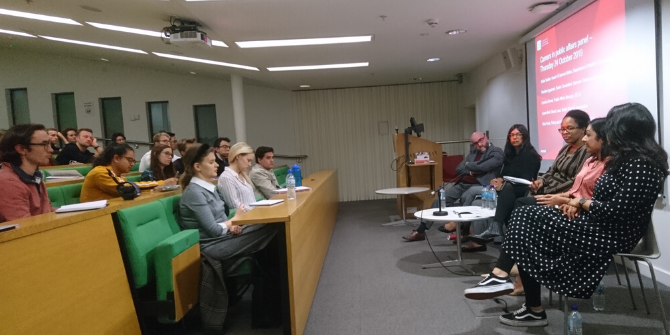Guest Blog from Megan Marsh, Public Affairs Team, LSE
Working with the UK Parliament
Parliament wants to know about the latest PhD research. And there are a number of ways you can feed your research into policy creation, from placements in Parliament specifically for PhD students, to special opportunities to highlight your research for a political audience.
The Parliamentary Office for Science and Technology (POST) runs a fellowship PhD scheme which enables PhD students to spend (usually) three months working with them.
Most fellows will research, write and publish a POSTnote during their time, which will be used by MPs and Peers to inform their work. Some have also been placed with a Parliamentary Select Committee or Library, which scrutinise the work of Government.
Some of these fellowships are run by Societies (eg. The Royal Ecological Society), and while they are more STEM-leaning, others are via ESRC, for example working on alternative currencies. You can read about some experiences of placements, as well as find out about this year’s placements, here. Planning ahead for placements, as well as placing your research, over your PhD tenure is worth considering.
Working with the UK Government
Research synthesis and methodological skills are in demand across Government departments.
Short term projects for PhD student have involved data analytics – providing researchers with exclusive access to Government data and allowing for real-life translation of research. Opportunities will be shared by LSE Careers.
The Policy Internships Scheme provides opportunities for PhD students, who are funded by UK Research and Innovation, to work for three months, with partners including the Department for Education, the Department for Digital, Culture, Media and Sport, and the Department for Work and Pensions. A full list of recent partners is here.
Beyond placements, there are other ways to work with Government departments and feed in your research. Departments nearly all have published Areas of Research Interest, known as ARIs.
ARIs bring academic expertise to the heart of policy-making, raising awareness among academic communities of Government’s analytical priorities, so research can align with policy development to maximise impact. It is worth looking at the ARIs to see if your PhD research covers any of the areas – and if it does, get in touch with the LSE Public Affairs team who can help with next steps. Behavioural Science, used in its broadest sense, is a major cross-cutting theme in the ARIs: incentivising behaviours; effective interventions; and behaviours relating to risk are just some of the areas being considered across Government.
Identifying members of the Government and Parliament who will be interested in your research is a worthwhile and rewarding exercise. The Public Affairs team are always keen to hear about new PhD research, and help with ideas and engagement.
You don’t have to want a job in policy to take an interest in any of the above (although it is certainly a driver for some!), as researchers are increasingly required to demonstrate how their work influences the outside world. And there are now more chances than ever before to do exactly that.
Have a question and want to find out more? Get in touch with Megan (LSE Public Affairs) or book an appointment with PhD and Research Staff Careers Consultant, Catherine Reynolds on CareerHub.





